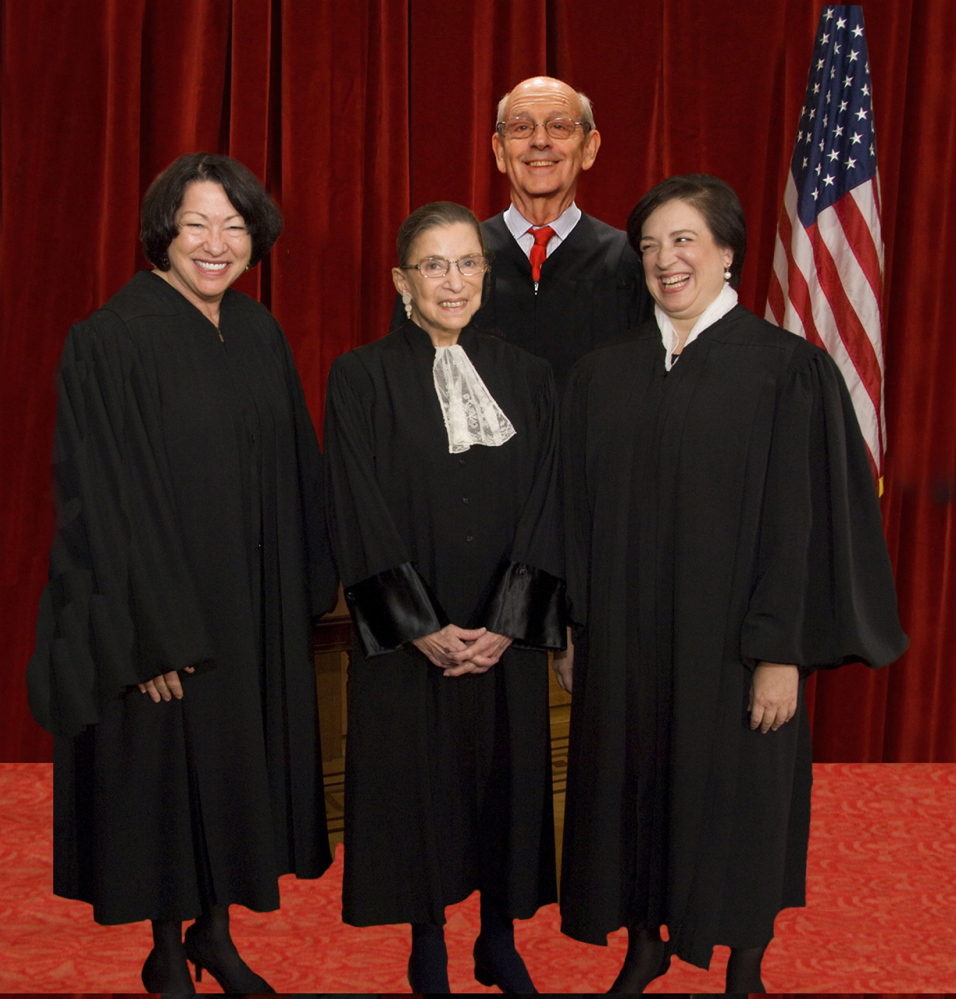The summer of 2014 has turned into something of a national folk feminist revival, as far as the Supreme Court is concerned. Justice Ruth Bader Ginsburg — who this summer marked her 21st anniversary at the court — is currently enjoying levels of hero-worship a Kardashian would kill for.
Justice Sonia Sotomayor, who marked her fifth year on the court this summer, is ever more widely feted as the “people’s justice,” both for her propensity to shop at Costco, and her willingness to engage with ordinary people outside the academic and legal spheres. Elena Kagan has been quieter around gender questions, both on the court and off, but it’s also impossible to read her dissenting opinion in Harris v. Quinn — the union fees case that disproportionately affected female home health care workers — as anything other than an opinion with substantial gender implications.
While it’s not at all clear how this incredibly gender-divided term will shake out at the court, or at the ballot box, it’s beyond dispute that the three women justices, as women, and also as justices, have become a powerful voice for women’s interests and concerns at the high court in ways that we have never witnessed in this country. Indeed Ginsburg, in an interview with Katie Couric, went so far as to say that the five men in the Hobby Lobby majority had a “blind spot” with respect to women’s issues, a statement that kicked up the requisite furor among Ginsburg’s critics on the right, and just about doubled the adulation from women on the left.
Amid all the gender talk, then, it’s been no surprise that, as Lyle Denniston noted on Yahoo News, the headlines across the boards this summer have trumpeted the notion that the women were applying a special kind of women’s justice at the highest court in the land, and that their gender is influencing their votes, whether or not you agree with the legal outcomes. And that’s why it’s worth offering up a brief shout out to the unsung feminist at the court, Justice Stephen Breyer, who has consistently voted alongside the court’s three women on virtually all gender issues and nobody has yet made a Tumblr for him.
Breyer, who celebrated his 20th year at the high court this summer, is a unique blend of steely pragmatism and dreamy optimism. Breyer is without a doubt the most ardent believer in government, systems, democracy and in the American public. And despite the fact that each of those seems to grow ever more dismal, he is an equally ardent believer that people are fundamentally well suited to govern themselves and that, left to our own devices, we will eventually prove that democracy is about as fabulous as Proust.
But Breyer is also a feminist, voting for women’s rights in cases ranging from upholding buffer zones surrounding abortion clinics in 2000 to voting with the dissenters in the Lilly Ledbetter fair pay appeal in 2007, for women’s reproductive rights in Gonzales v. Carhart in 2007, and for the women workers of Wal-Mart v. Dukes in 2011.
He wrote an important dissent when the court declined to stay Texas’ onerous new abortion law last year, explaining that if the Texas admitting privileges law were to go into effect, the state “provides no assurance that a significant number of women seeking abortions will not be affected, and the District Court unquestionably found that ‘there will be abortion clinics that will close,'” and recognizing that “the longer a given facility remains closed, the less likely it is ever to reopen even if the admitting privileges requirement is ultimately held unconstitutional.”
And while many of us wondered aloud why Breyer voted with the majority in the Wheaton College appeal late this summer, the follow-on case to Hobby Lobby involving a religious college’s objection to the contraception mandate (the case that about sent the court’s three women into orbit in dissent), it’s certainly more than fair to say that Breyer, like David Souter and John Paul Stevens and William J. Brennan and many men before him, has been a staunch defender of women’s rights and freedoms for a long time, often without getting too much credit, especially from the women.
Now one possibility is that Breyer’s tendency to side with the court’s women means that gender doesn’t matter there at all. The other possibility is that it matters a good deal, and you needn’t be a female to understand that. The fact that Breyer doesn’t have that “blind spot” — that he can comprehend the interests of the women in both Hobby Lobby and Harris — is proof that the system works in ways that are not confined to gender, and that we can all transcend personal experience to imagine someone else’s life. In fact, it seems to me that the best possible takeaway from this past term is not that the court’s three women spent June tearing their hair out over those two cases, but that the bald white guy quietly joined them. Nobody doubts that these opinions and dissents lift off because they are written by Ginsburg. But nobody should forget that they matter because they are joined by Breyer.
So while Ginsburg has gotten the lion’s share of the attention for her smoking dissents and signature jabots, let’s take a moment to raise a beer and a Tumblr for the guy who proves year in and year out that you needn’t be a women to be a passionate advocate for gender fairness at the court. You only need to listen to one.
Dahlia Lithwick writes about the courts and the law for Slate. This column appeared on Slate.com, an online current affairs and culture magazine owned by The Washington Post.
Send questions/comments to the editors.




Success. Please wait for the page to reload. If the page does not reload within 5 seconds, please refresh the page.
Enter your email and password to access comments.
Hi, to comment on stories you must . This profile is in addition to your subscription and website login.
Already have a commenting profile? .
Invalid username/password.
Please check your email to confirm and complete your registration.
Only subscribers are eligible to post comments. Please subscribe or login first for digital access. Here’s why.
Use the form below to reset your password. When you've submitted your account email, we will send an email with a reset code.